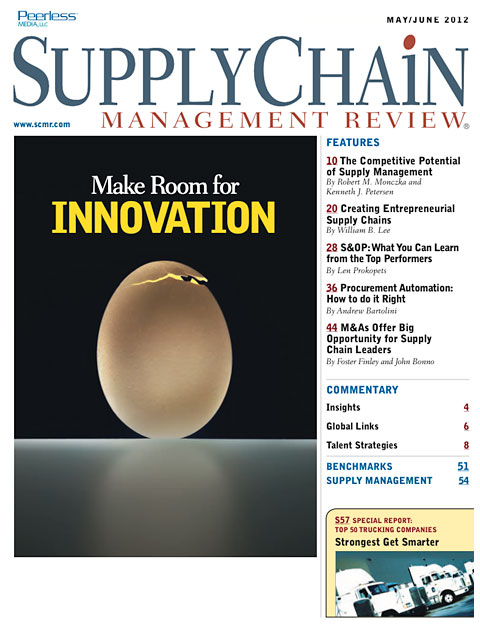Sorry, but your login has failed. Please recheck your login information and resubmit. If your subscription has expired, renew here.
May-June 2012
Supply management can be a powerful competitive weapon—if the strategy driving that activity is closely aligned with the business strategy. Yet new research suggests that the necessary alignment is often lacking. CAPS Research experts offer a process for identifying and implementing the supply management strategies that hold maximum potential for competitive advantage. Browse this issue archive.Need Help? Contact customer service 847-559-7581 More options
The notion that the elements of supply chains—from suppliers’ suppliers to customers’ customers—can be used in an entrepreneurial manner is a powerful one. We call this emerging concept entrepreneurial supply chains, and we believe that companies should aggressively implement and practice it. But because it is a new concept, perhaps we need to set the stage to explain just
what we mean.
What is an entrepreneur? An entrepreneur begins a business with fresh ideas that hold opportunity for profit and growth. The entrepreneur obtains resources, begins the venture, bears the risks, and reaps the payoff or suffers the loss. The business can be a start-up or a unit of an established venture. Further, entrepreneurial activities can be “replicative” or “innovative” in nature. The vast majority are in the replicative category because they reproduce or closely follow past successes. But even replicative entrepreneurial initiatives originated with innovative ideas. McDonald’s and Starbucks are classic examples of replicative entrepreneurship, though they both began with innovative ideas.
Innovative entrepreneurial activities — and the leaders behind them — represent truly new ideas and leadership models. Steve Jobs is a perfect example. Jobs’ brand of innovative entrepreneurship has not yet moved into the replicative arena. With his untimely death, only time will tell when or if that happens. For the purposes of our discussion, we include both the innovative and replicative types of entrepreneurial supply chains.
What are entrepreneurial supply chains? Entrepreneurial supply chains go beyond the traditional focus on cost, quality, and delivery to also embrace innovation and growth. Entrepreneurial supply chains connect customers’ customers with suppliers’ suppliers. They are designed to achieve growth in the enterprise by recognizing and responding to needs and opportunities that call for growth-focused responses. Note upfront, though, that moving from a traditional to an entrepreneurial supply chain is not always easy. It demands major shifts in mindsets.
Entrepreneurial supply chains typically follow one of three “paths” that can be described as follows:
 |
This complete article is available to subscribers
only. Click on Log In Now at the top of this article for full access. Or, Start your PLUS+ subscription for instant access. |
Not ready to subscribe, but need this article?
Buy the complete article now. Only $20.00. Instant PDF Download.
Access the complete issue of Supply Chain Management Review magazine featuring
this article including every word, chart and table exactly as it appeared in the magazine.
SC
MR
Sorry, but your login has failed. Please recheck your login information and resubmit. If your subscription has expired, renew here.
May-June 2012
Supply management can be a powerful competitive weapon—if the strategy driving that activity is closely aligned with the business strategy. Yet new research suggests that the necessary alignment is often lacking.… Browse this issue archive. Download a PDF file of the May-June 2012 issue.
 |
Download Article PDF |
The notion that the elements of supply chains—from suppliers’ suppliers to customers’ customers—can be used in an entrepreneurial manner is a powerful one. We call this emerging concept entrepreneurial supply chains, and we believe that companies should aggressively implement and practice it. But because it is a new concept, perhaps we need to set the stage to explain just
what we mean.
What is an entrepreneur? An entrepreneur begins a business with fresh ideas that hold opportunity for profit and growth. The entrepreneur obtains resources, begins the venture, bears the risks, and reaps the payoff or suffers the loss. The business can be a start-up or a unit of an established venture. Further, entrepreneurial activities can be “replicative” or “innovative” in nature. The vast majority are in the replicative category because they reproduce or closely follow past successes. But even replicative entrepreneurial initiatives originated with innovative ideas. McDonald’s and Starbucks are classic examples of replicative entrepreneurship, though they both began with innovative ideas.
Innovative entrepreneurial activities — and the leaders behind them — represent truly new ideas and leadership models. Steve Jobs is a perfect example. Jobs’ brand of innovative entrepreneurship has not yet moved into the replicative arena. With his untimely death, only time will tell when or if that happens. For the purposes of our discussion, we include both the innovative and replicative types of entrepreneurial supply chains.
What are entrepreneurial supply chains? Entrepreneurial supply chains go beyond the traditional focus on cost, quality, and delivery to also embrace innovation and growth. Entrepreneurial supply chains connect customers’ customers with suppliers’ suppliers. They are designed to achieve growth in the enterprise by recognizing and responding to needs and opportunities that call for growth-focused responses. Note upfront, though, that moving from a traditional to an entrepreneurial supply chain is not always easy. It demands major shifts in mindsets.
Entrepreneurial supply chains typically follow one of three “paths” that can be described as follows:
 |
SUBSCRIBERS: Click here to download PDF of the full article. |
SC
MR

Latest Supply Chain News
- Tech investments bring revenue increases, survey finds
- Survey reveals strategies for addressing supply chain, logistics labor shortages
- Israel, Ukraine aid package to increase pressure on aerospace and defense supply chains
- How CPG brands can deliver on supplier diversity promises
- How S&OP provides the answer to in-demand products
- More News
Latest Resources

 Explore
Explore
Latest Supply Chain News
- Tech investments bring revenue increases, survey finds
- Survey reveals strategies for addressing supply chain, logistics labor shortages
- Israel, Ukraine aid package to increase pressure on aerospace and defense supply chains
- How CPG brands can deliver on supplier diversity promises
- How S&OP provides the answer to in-demand products
- AI, virtual reality is bringing experiential learning into the modern age
- More latest news
Latest Resources

Subscribe

Supply Chain Management Review delivers the best industry content.

Editors’ Picks





